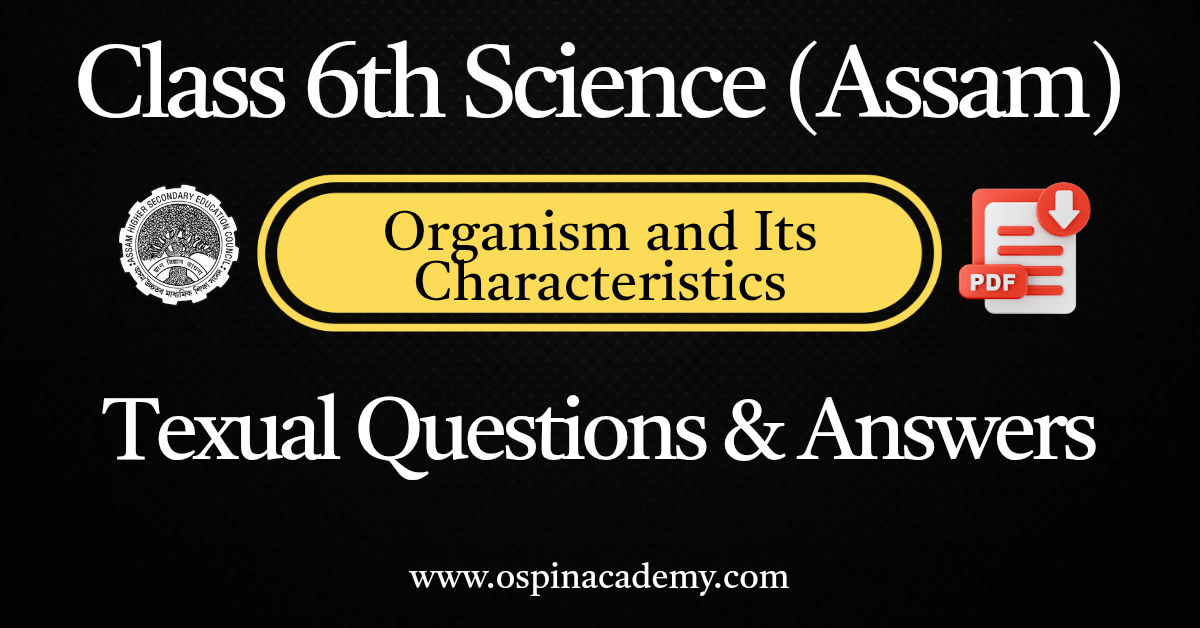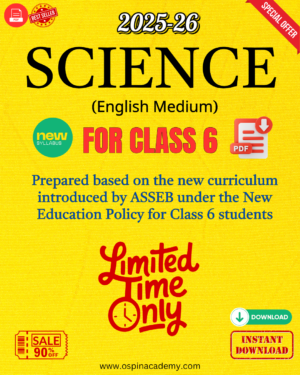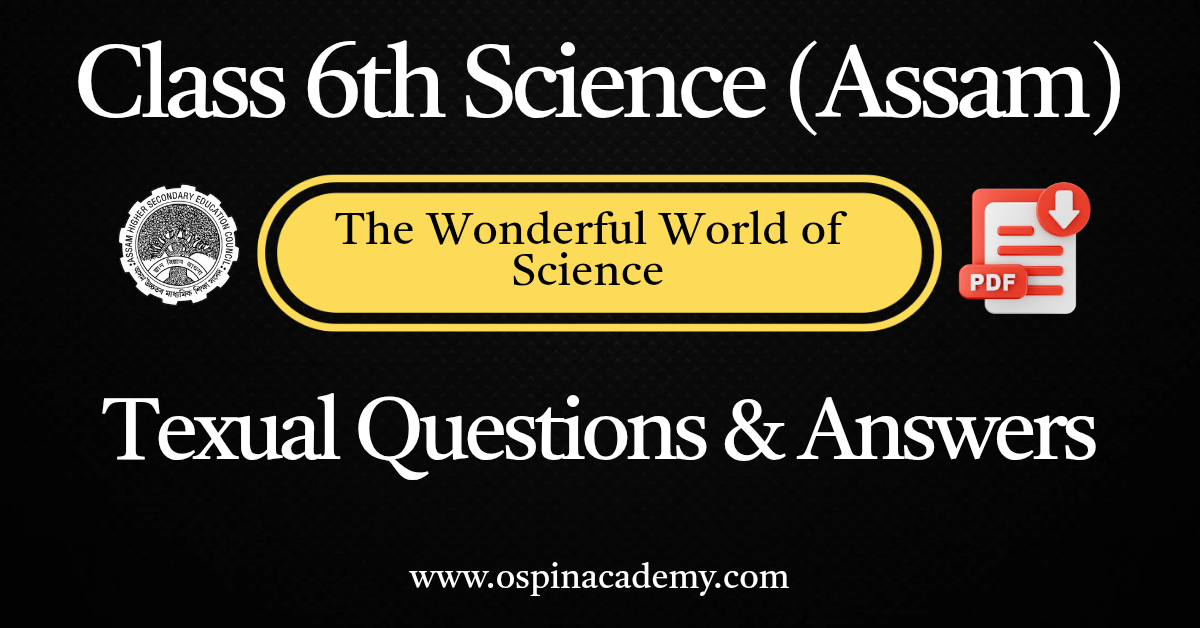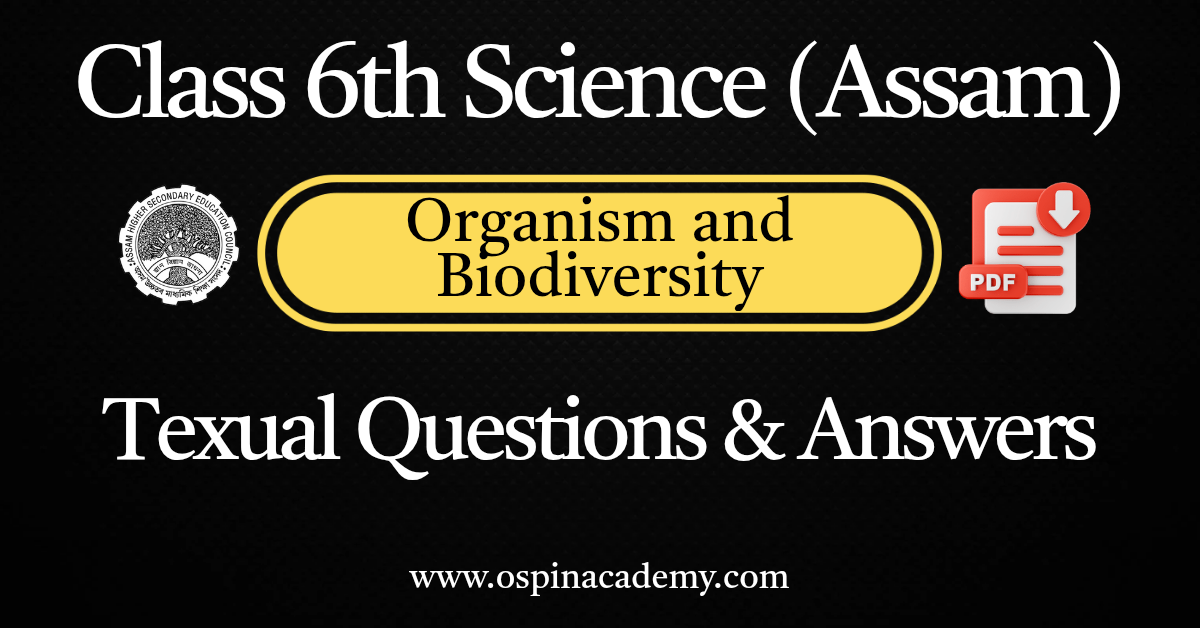Discover the fascinating world of living beings with Class 6 *Amar Bigyan* Chapter 8 – Organism And It’s Characteristics, crafted as per the new SCERT Assam syllabus 2025-26 for English Medium students. This chapter introduces students to the defining traits of organisms, exploring what makes living things unique and how they differ from non-living objects. Aligned with the updated Assam board curriculum, it fosters curiosity and scientific inquiry, encouraging young learners to observe and understand the characteristics of life in their surroundings.
The new syllabus 2025-26 emphasizes hands-on learning and conceptual clarity, making this chapter a vital part of the Class 6 curriculum. Students will explore key characteristics of organisms, such as growth, reproduction, movement, and response to stimuli, while learning how these traits distinguish living things from non-living ones. The chapter also covers basic needs of organisms and their adaptations to various environments, with a focus on local examples from Assam. Scan the QR code N9K8C1 to access interactive resources and deepen your understanding of organisms as per the SCERT Assam English Medium curriculum.
✅ What You’ll Learn in Chapter 8:
- Definition and characteristics of organisms in the new SCERT Assam syllabus
- Key traits of living things: growth, reproduction, movement, and response to stimuli
- Differences between living and non-living things
- Basic needs of organisms: food, water, air, and shelter
- Adaptations of organisms to their environments
- Introduction to the classification of organisms based on characteristics
- Role of organisms in ecosystems and their interdependence
- Inquiry-based activities to observe living things, as per the 2025-26 curriculum
- Real-world examples of organisms and their characteristics in Assam’s context
🎯 Why Choose Ospin Academy for Class 6 Amar Bigyan?
- 100% aligned with the SCERT Assam English Medium new syllabus 2025-26
- Clear, concise explanations, accurate Q&A, and exam-ready notes
- Ideal for Assam board students preparing for the updated curriculum
- Engaging video lessons available on Ospin Academy’s YouTube channel
- Downloadable resources, including chapter notes, MCQs, and QR code N9K8C1 content
- Focus on conceptual clarity and practical applications as per new syllabus guidelines
With the new SCERT Assam syllabus 2025-26, learning about organisms and their characteristics is both educational and inspiring! Ospin Academy’s resources make Chapter 8 – Organism And It’s Characteristics engaging, accessible, and easy to master. Use the QR code N9K8C1 to unlock additional study materials and join Ospin Academy to excel in the updated Class 6 Amar Bigyan curriculum while building a strong foundation in life sciences!
SCERT Assam Class 6 Science (Amar Bijnan) – English Medium Chapter-wise Solutions PDF
Special Combo Offer!
(For SCERT Assam Class 6, 2025)
Get complete chapter-wise Science (Amar Bijnan) solutions in English Medium prepared by expert teachers.
Covers all textbook exercises, key concepts, definitions, and diagrams as per the latest SCERT Assam syllabus.
Ideal for concept clarity, homework assistance, and exam preparation.

Class 6th Science
ORGANISM AND ITS CHARACTERISTICS
Exercise
Darken the circle of correct answer
Q.1. Which of the following does not grow?
(a) Tree
(b) Cycle
(c) Child.
(d) Butterfly
Answer:(b)
Q.2. Which is not a requirement for seed germination?
(a) Light
(b) Suitable temperature
(c) Fertilizer
(d) Water
Answer:(c)
Q.3. Fishes move in water with the help of their-
(a) Fins
(b) Wings
(c) Tail
(d) Legs
Answer:(a)
Q.4. Which one of the following animals can live on land as well as in water?
(a) Fish
(b) Frog
(c) Fox
(d) Whale
Answer:(b)
Q.5. The leaves of which one of the following plants fold up on being touched? (a) Indian gooseberry
(b) Sunflower
(c) Mimosa
(d) Pitcher plant
Answer:(c)
Q.6. Where do mosquitoes lay eggs?
(a) In stagnant water
(b) Under leaf
(c) On land
(d) River
Answer:(a)
Q.7. Which of the following is seen in a tadpole?
(a) Legs and gills
(b) Tail and gills
(c) Lungs and tail
(d) Only gills
Answer:(b)
Q.8. Match the Column A with Column B
|
Column-A |
Column -B |
|
(a) Opening of Flower |
(i) Taking in and out of air |
|
(b) Excretion |
(ii) Grows upward |
|
(c) Shoot |
(iii) Removal of water and waste from body |
|
(d) Breathing |
(i) Taking in and out of air |
Answer:
|
Column-A |
Column -B |
|
(a) Opening of Flower |
(iv) Movement in plant |
|
(b) Excretion |
(iii) Removal of water and waste from body |
|
(c) Shoot |
(ii) Grows upward |
|
(d) Breathing |
(i) Taking in and out of air |
Q.9. Fill in the blanks with appropriate word.
(a) The tiny structure inside a seed that develops into a plant is-_________
(b) All living beings respond to ______
(c) The________ transforms into an adult mosquito.
(d) Birds can fly, which is a characteristic of________ things
(e) Living thins ______over time.
(f) ______.and _______diseases are transmitted by mosquito
(g) Frogs are a type of _____animal.
Answer:
(a) embryo
(b) stimuli
(c) larva
(d) living
(e) evolve
(f) Malaria, dengue
(g) Amphibian
Q.10. Select the correct order in the live cycle of a frog
(a) Egg-tadpole-froglet-frog
(b) Froglet-egg-frog-tadpole
(c) Egg-froglet-tadpole-frog
(d) Tadpole-froglet-egg-frog
Q.11. What does an adult frog use to breathe, lungs or gills?
Answer: An adult frog uses lungs to breathe.
Q.12. What are the three basic characteristics of all living or-ganisms?
Answer: The three basic characteristics of all living organisms are–
(a) Growth: All living things grow and develop over time.
(b) Excretion: Living things remove waste materials from their bodies.
(c) Reproduction: Living organisms have the ability to produce off spring.
Q.13. Like animals, a car can also move, but it is not considered as a living organism give two reason.
Answer: A car is not considered as a living organism because
(i) A car connot move by itself it requirs an external force to make it move.
(ii) A car does not have life processes like growth, reproduce breathings etc.
Q.14. Why is reproduction important for orqanisms.
Answer: Reproduction is important for organisms because it en-sures the continuit of life.
Q.15. Name the different stages of the life cycle of a frog.
Answer: The different stages of the life cycle of a frog are-egg, tadpole, froglet and adult frog.
Q.16. Draw the diagram of the life cycle of a mosquito
Answer:
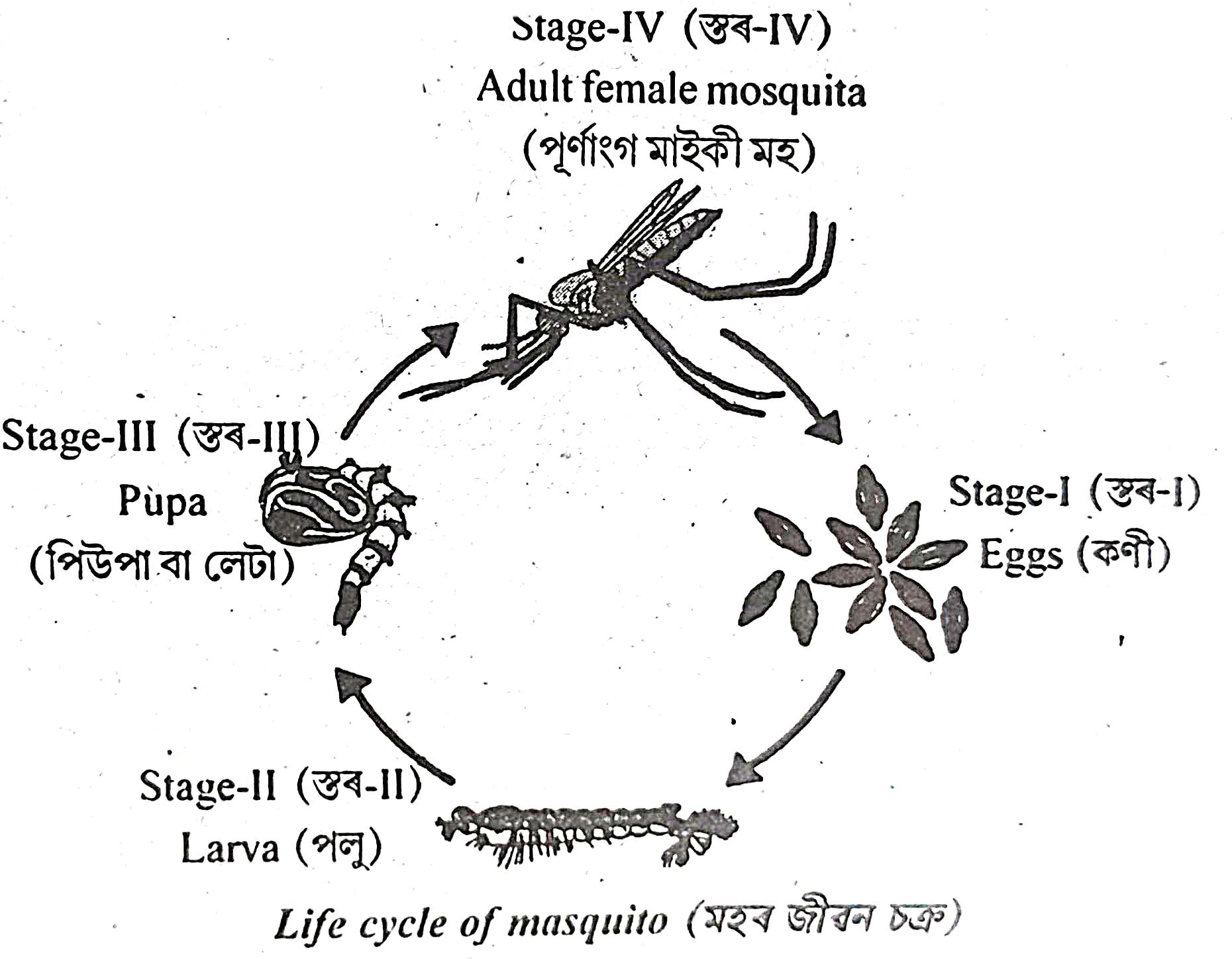
Class 6 Amar Bigyan Chapter 8 – Organism And It’s Characteristics FAQs
Get Free NCERT PDFs
If you want to download free PDFs of any chapter, click the link below and join our WhatsApp group:
